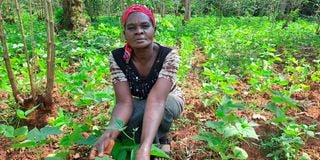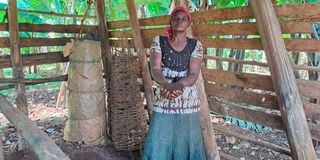Premium
Agroecology: New path to food security

Mary Khasoa, a small-scale farmer in Bungoma County, at her farm.
What you need to know:
- Solutions exist that can help mitigate the effects of climate change and build more resilient food systems.
- Agroecology is a sustainable farming approach that integrates ecological principles with agricultural practices.
As the 2024 United Nations Climate Change Conference (COP29) concluded in Baku, Azerbaijan, one undeniable reality stood out: the devastating impact of climate change on global food security is being felt worldwide.
According to statistics, in 2023, an estimated 735 million people worldwide suffered from hunger, exacerbated by climate-induced challenges like extreme heat, droughts, floods and unpredictable weather patterns.
Projections suggest that climate change could push an additional 132 million people into extreme poverty by 2030, with food inflation soaring by as much as 50 per cent by 2035.
In Kenya and across the Horn of Africa, the impact has been especially severe, with some regions experiencing their worst drought in nearly four decades.
In this changing climate, one of the most significant threats to food security is the reduced productivity of the agriculture sector, which millions of people across Africa depend on for their livelihoods.
The World Bank estimates that climate change could reduce crop yields by up to 25 per cent by the end of the century, making it harder for farmers to grow enough food to feed their families, let alone supply the market.
But solutions exist that can help mitigate the effects of climate change and build more resilient food systems. One such solution that is gaining traction is agroecology — a sustainable farming approach that integrates ecological principles with agricultural practices.
According to Jimmy Mweri, an agronomist with the Food and Agriculture Organization (FAO), agroecology is not just a farming method, “it’s a holistic approach to food production that acknowledges the interdependencies among crops, animals, soil, and the environment”.
By focusing on sustainability, he says, agroecology seeks to reduce reliance on chemical inputs, enhance soil fertility, and increase biodiversity—all while ensuring that farming remains economically viable.
“Agroecology looks at farming from a systems perspective. It takes into account how crops, livestock, and the environment interact. It ensures that farmers are able to produce food in a way that preserves the environment, improves soil health, and increases productivity,” says Mweri.
Through initiatives like the Boosting Sustainable Food Production in Kenya project, agroecology is being introduced to farmers across the country. The project led by FAO is being executed in five counties—Bungoma, Kakamega, Migori, Homa Bay and Nandi.
Funded by the European Union, and in partnership with the International Fund for Agricultural Development and the Kenyan government, the project targets 40,000 farmers and uses a mobile-based electronic voucher system to provide agricultural inputs.
“This programme is to ensure that farmers have access to essential farming tools and resources, while promoting sustainable agricultural practices,” explains David Makongo, a FAO agribusiness specialist. According to Makongo, the project’s goal is not just to improve crop yields but to build resilience against climate shocks.
One key principle of agroecology is recycling—reusing waste in the farming system. “Farmers are encouraged to use organic methods of pest control, fertilisation and soil health improvement,” explains Mweri.
For example, instead of relying on chemical pesticides, farmers like Mary Khasoa, a small-scale farmer in Kamasielo, Bungoma County, have turned to natural alternatives. She uses manure from her livestock and has planted specific types of plants, like comfrey hub, to repel pests and for compost manure production.
Khasoa’s journey into agroecology began when she and her husband realised that their traditional farming methods were no longer sustainable. With a family to support and a farming business that was not yielding enough to cover their needs, they decided to adopt agroecology after receiving training from the FAO’s project.

Mary Khasoa displays compost manure she produces on her farm for both personal use and sale.
Before adopting agroecology, Khasoa’s farm relied heavily on inputs like chemical pesticides, herbicides and synthetic fertilisers, all of which were costly and harmful to the environment. But after switching to agroecological practices, she began to see significant improvements in both crop yields and farm sustainability.
“One of the biggest changes has been the reduction in costs,” she explains. “I no longer buy chemicals or expensive fertilisers. I make my own fertilisers using organic methods, which has been much cheaper. I use manure from my cows and other organic matter to enrich the soil.”
Further, Khasoa’s farm is diverse—she grows beans, maize, cassava, coffee and more than 200 banana plants on her seven-acre plot.
She also raises livestock, including cows, and has beehives for honey production, making her farm a model of agroecology. In addition to growing food, Khasoa is also involved in environmental conservation. She has planted trees on her farm, both for timber and as part of a broader effort to improve soil health and reduce erosion.
“The trees, along with the livestock and crops, form a closed-loop system that helps her farm stay productive, even in the face of changing weather patterns,” explains Mweri.
However, while Khasoa’s farm has flourished under agroecology, challenges remain. One of the most significant hurdles she faces is fluctuating market prices. For example, although she sells bananas to a local cooperative, the prices can vary depending on the season and demand, making income from banana sales less predictable. But she has found ways to navigate these challenges.
“When market prices are low, I can sell firewood or timber from my trees to generate income. It’s about diversifying and making sure that I have multiple income streams,” she says.
According to Mweri, the ability to adapt and diversify is one of the key benefits of agroecology. “It creates a more resilient farming system that can withstand market volatility and external shocks.”
Another challenge Khasoa’s faces is the labour-intensive nature of agroecology. However, the long-term rewards are worth it.
“My farm is now a source of income, and I can support my family and community in ways I never thought possible,” says Khasoa, one of the farmers who have been getting support from one of the project’s hub in Kimilili.
Gideon Muyekho, an agroecological service provider (ASP) at the hub explains that before they began operations, conventional farming practices resulted in lower yields, high costs and poor service delivery due to untrained providers, which limited farmers’ access to education and effective agricultural techniques.
Farmers register with the hub and, when seeking assistance, are assigned an ASP based on their specific needs. Once services are completed, payments are processed through the hub’s system, with a 5 per cent fee to ensure sustainability.
“This structure has fostered trust and increased service requests, with 200 farmers already registered and a goal of 4,000 by the end of the year,” explains Muyekho.
According to Makongo, as Kenya and other countries in the Horn of Africa experience the increasing impacts of climate change, embracing practices like agroecology will be key to ensuring that future generations can continue to farm and feed the world.
“Agroecology may not be a silver bullet, but it is a vital piece of the puzzle when it comes to creating more sustainable, climate-resilient food systems in Kenya and beyond,” he adds.





